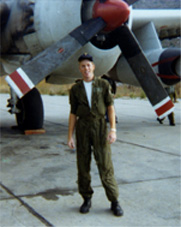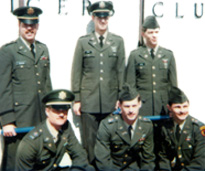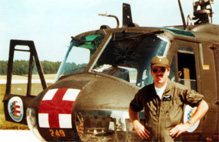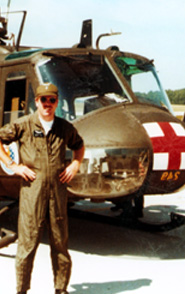|
Chuck Osborne:
Detailed Biography
Detailed
Biography
|
Biographical Highlights
Early Years
Military Career
Aviation Career
Post-Aviation Career
Family
Education
Osborne Family Genealogy
Military Career
Upon graduation from high school, I completed a four-year
enlistment in the U.S. Navy where I served as an aircrew member
aboard anti-submarine patrol aircraft. My Navy squadron deployed
overseas on two occasions.
The first deployment was to a Naval Air Facility in Sigonella,
Sicily, where my squadron was deployed from June, 1969 through
November, 1969. My Navy squadron, VP-23, home-based in
Brunswick, Maine, flew WWII vintage aircraft called SP-2H “Neptune,” which were used as submarine hunters.

My second overseas deployment was split between two
locations. The squadron was deployed in October 1970, from our
home base in Brunswick, Maine, to the Lajes Air Force Base on the
island of Terceira in the Azores. After a few months there, the
squadron transferred to Rota, Spain, and then returned stateside
in March, 1971.
My second overseas deployment with VP-23 marked the first
deployment following the squadron’s transition to the
P-3B
“Orion” aircraft.
I soon realized that I wanted to be more than an aircrew
member; I wanted to be a pilot. As soon as possible, I took
flight lessons on the G.I. Bill and earned my commercial pilots
license and a flight instructor’s rating before being honorably
discharged from the U.S. Navy in 1972.
After my discharge, I supported myself by working as a flight
instructor in Pontiac, Michigan, but soon discovered that I
could not support my growing family. So, I returned to Maine, and
for several years worked full-time as an estimator and salesman
in the floor covering industry, but I
continued to pursue my passion for flying by working weekends as
a flight instructor.
My desire to return to flying fulltime led me to join the
Army National Guard in 1975. My plan was to enter flight school
for helicopter flight training and use this training to secure a
civilian aviation career. However, flight-training slots were in
short supply for the foreseeable future, so I applied and was
accepted into a 15-month Officer Candidate School program with
the Maine Army National Guard. I completed the program and was
commissioned as a 2nd Lieutenant in June, 1977.
 After completing the officer basic course at Ft. Sam Houston
in San Antonio, Texas, and realizing the Maine National Guard
would not have slots to flight school anytime soon, I
transferred to the Kentucky Army National Guard. The Kentucky
Army National Guard soon issued orders for me to attend flight
school and in July 1978, I began helicopter flight training at
the U.S. Army’s Rotary Wing Flight Training School in Ft.
Rucker, Alabama. The nine-months of helicopter flight training were very
challenging and rewarding and culminated with graduation on
March 9, 1979. After completing the officer basic course at Ft. Sam Houston
in San Antonio, Texas, and realizing the Maine National Guard
would not have slots to flight school anytime soon, I
transferred to the Kentucky Army National Guard. The Kentucky
Army National Guard soon issued orders for me to attend flight
school and in July 1978, I began helicopter flight training at
the U.S. Army’s Rotary Wing Flight Training School in Ft.
Rucker, Alabama. The nine-months of helicopter flight training were very
challenging and rewarding and culminated with graduation on
March 9, 1979.
I returned to Kentucky after flight school and
was assigned to the 441st Medical Detachment where I flew a UH-1
helicopter, affectionately called the “Huey.” In addition to my duties as a pilot, I also filled various
staff officer positions and rose to the rank of 1st Lieutenant
while with the Kentucky ARNG.
 In September 1981, my guard unit spent its two-week summer
camp in east-central Germany. This picture of me with the “Huey”
was taken at Ft. Campbell, Kentucky, just before departure for
Germany in a C-5A Galaxy transport plane. Four UH-1 helicopters, seven trucks and over
one-hundred personnel were loaded onto this one plane and
flown nonstop from Ft. Campbell, Kentucky, to Frankfurt,
Germany. To learn more about the UH-1 helicopter, I recommend
visiting either http://www.fas.org/man/dod-101/sys/ac/uh-1.htm or http://www.centennialofflight.gov/essay/Rotary/Huey/HE11.htm
. In September 1981, my guard unit spent its two-week summer
camp in east-central Germany. This picture of me with the “Huey”
was taken at Ft. Campbell, Kentucky, just before departure for
Germany in a C-5A Galaxy transport plane. Four UH-1 helicopters, seven trucks and over
one-hundred personnel were loaded onto this one plane and
flown nonstop from Ft. Campbell, Kentucky, to Frankfurt,
Germany. To learn more about the UH-1 helicopter, I recommend
visiting either http://www.fas.org/man/dod-101/sys/ac/uh-1.htm or http://www.centennialofflight.gov/essay/Rotary/Huey/HE11.htm
.
I left the Kentucky Army National Guard in early 1982, but
several years later joined the Ohio National Guard and served as
a staff officer and a pilot for the 107th Air Calvary Regiment
located at the Akron-Canton airport. There, I flew for
approximately two years and held the rank of Captain when I
resigned from the military for good late in 1990.
 Return to Top |
Next to Aviation Career
Return to Top |
Next to Aviation Career
|


